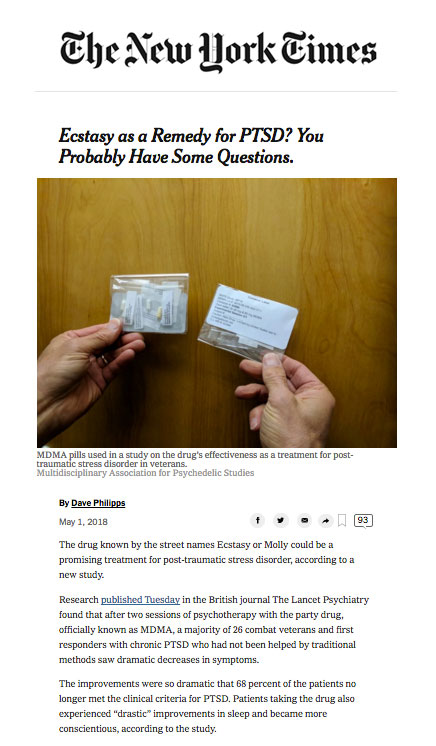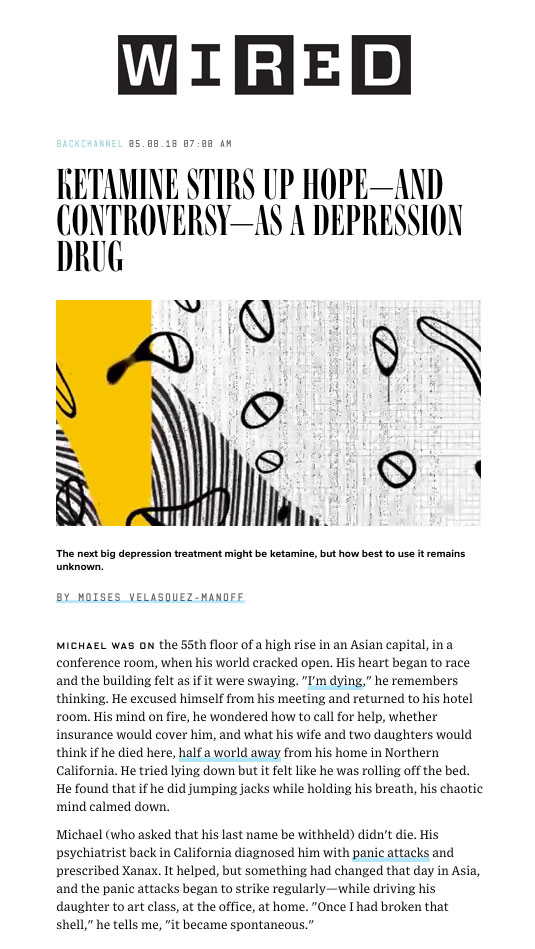I am currently part of the research team studying whether a combination of psychotherapy enhanced by MDMA (street name: ecstasy) is an important strategy for working with PTSD (post-traumatic stress) sufferers. Primarily aimed as a medication for Veterans of combat in Afghanistan and Iraq, it has also been seen as useful for firefighters and police who have served in front line situations such as the 9/11 site in New York City and others who have suffered trauma. The research on MDMA is now in its 3rd (final) phase and I look forward to further government approved study of the psychotherapeutic uses of this important aid. Here is the New York Times coverage of the efforts:
Ecstasy as a Remedy for PTSD? You Probably Have Some Questions.
The drug known by the street names Ecstasy or Molly could be a promising treatment for post-traumatic stress disorder, according to a new study.
Research published Tuesday in the British journal The Lancet Psychiatry found that after two sessions of psychotherapy with the party drug, officially known as MDMA, a majority of 26 combat veterans and first responders with chronic PTSD who had not been helped by traditional methods saw dramatic decreases in symptoms.
The improvements were so dramatic that 68 percent of the patients no longer met the clinical criteria for PTSD. Patients taking the drug also experienced “drastic” improvements in sleep and became more conscientious, according to the study.
The results, which mirror those of similar, small-scale studies of the illegal drug in recent years, come as MDMA is about to enter larger, Phase 3 trials this summer. Based on previous results, the Food and Drug Administration has given MDMA breakthrough therapy status, which could speed approval. If large-scale trials can replicate safety and efficacy results, the drug could be approved for legal use by 2021.
In addition, I have also participated in trainings by The Ketamine Training Center in which ketamine, ordinarily used as an anesthetic for children and in veterinary medicine, has an off-label use of providing a mild euphoric effect stimulating both biological and psychological alternatives to depressive thought patterns. The work of integrating this compound into a traditional practice of providing psychotherapy is quite promising as this recent article in Wired magazine explores:
Ketamine Stirs Up Hope—and Controversy—as a Depression Drug
The next big depression treatment might be ketamine, but how best to use it remains unknown.
Michael was on the 55th floor of a high rise in an Asian capital, in a conference room, when his world cracked open. His heart began to race and the building felt as if it were swaying. "I'm dying," he remembers thinking. He excused himself from his meeting and returned to his hotel room. His mind on fire, he wondered how to call for help, whether insurance would cover him, and what his wife and two daughters would think if he died here, half a world away from his home in Northern California. He tried lying down but it felt like he was rolling off the bed. He found that if he did jumping jacks while holding his breath, his chaotic mind calmed down.


